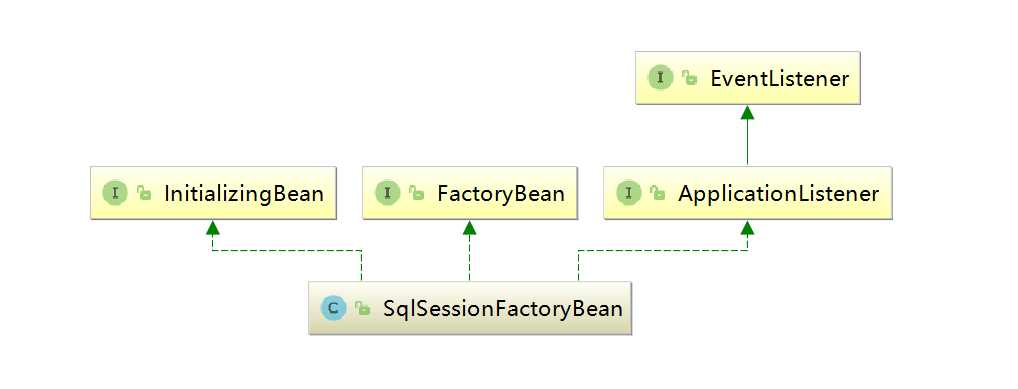标签:ini 树状 ali iter 源码 array .config 应该 nes
摘要: 本文结合《Spring源码深度解析》来分析Spring 5.0.6版本的源代码。若有描述错误之处,欢迎指正。
一、SqlSessionFactoryBean的初始化
二、获取 SqlSessionFactoryBean 实例
通过Spring整合MyBatis的示例,我们感受到了Spring为用户更加快捷地进行开发所做的努力,开发人员的工作效率由此得到了显著的提升。但是,相对于使用来说,我们更想知道其背后所隐藏的秘密,Spring整合MyBatis是如何实现的呢?通过分析整合示例中的配置文件,我们可以知道配置的bean其实是成树状结构的,而在树的最顶层是类型为org.mybatis.spring.SqlSessionFactoryBean的bean,它将其他相关bean组装在了一起,那么,我们的分析就从此类开始。
通过配置文件我们分析,对于配置文件的读取解析,Spring应该通过org.mybatis.spring.SqlSessionFactoryBean封装了MyBatis中的实现。我们进入这个类,首先査看这个类的层次结构,如下图所示。

根据这个类的层次结构找出我们感兴趣的两个接口,FactoryBean和InitializingBean:
我们首先以InitializingBean接口的afterPropertiesSet()方法作为突破点。
査看org.mybatis.spring.SqlSessionFactoryBean类型的bean在初始化时做了哪些逻辑实现。
@Override public void afterPropertiesSet() throws Exception { notNull(dataSource, "Property ‘dataSource‘ is required"); notNull(sqlSessionFactoryBuilder, "Property ‘sqlSessionFactoryBuilder‘ is required"); state((configuration == null && configLocation == null) || !(configuration != null && configLocation != null), "Property ‘configuration‘ and ‘configLocation‘ can not specified with together"); this.sqlSessionFactory = buildSqlSessionFactory(); }
很显然,此函数主要目的就是对于sqlSessionFactory的初始化,通过之前展示的独立使用MyBatis的示例,我们了解到SqlSessionFactory是所有MyBatis功能的基础。
protected SqlSessionFactory buildSqlSessionFactory() throws IOException { Configuration configuration; XMLConfigBuilder xmlConfigBuilder = null; if (this.configuration != null) { configuration = this.configuration; if (configuration.getVariables() == null) { configuration.setVariables(this.configurationProperties); } else if (this.configurationProperties != null) { configuration.getVariables().putAll(this.configurationProperties); } } else if (this.configLocation != null) { xmlConfigBuilder = new XMLConfigBuilder(this.configLocation.getInputStream(), null, this.configurationProperties); configuration = xmlConfigBuilder.getConfiguration(); } else { LOGGER.debug(() -> "Property ‘configuration‘ or ‘configLocation‘ not specified, using default MyBatis Configuration"); configuration = new Configuration(); if (this.configurationProperties != null) { configuration.setVariables(this.configurationProperties); } } if (this.objectFactory != null) { configuration.setObjectFactory(this.objectFactory); } if (this.objectWrapperFactory != null) { configuration.setObjectWrapperFactory(this.objectWrapperFactory); } if (this.vfs != null) { configuration.setVfsImpl(this.vfs); } if (hasLength(this.typeAliasesPackage)) { String[] typeAliasPackageArray = tokenizeToStringArray(this.typeAliasesPackage, ConfigurableApplicationContext.CONFIG_LOCATION_DELIMITERS); for (String packageToScan : typeAliasPackageArray) { configuration.getTypeAliasRegistry().registerAliases(packageToScan, typeAliasesSuperType == null ? Object.class : typeAliasesSuperType); LOGGER.debug(() -> "Scanned package: ‘" + packageToScan + "‘ for aliases"); } } if (!isEmpty(this.typeAliases)) { for (Class<?> typeAlias : this.typeAliases) { configuration.getTypeAliasRegistry().registerAlias(typeAlias); LOGGER.debug(() -> "Registered type alias: ‘" + typeAlias + "‘"); } } if (!isEmpty(this.plugins)) { for (Interceptor plugin : this.plugins) { configuration.addInterceptor(plugin); LOGGER.debug(() -> "Registered plugin: ‘" + plugin + "‘"); } } if (hasLength(this.typeHandlersPackage)) { String[] typeHandlersPackageArray = tokenizeToStringArray(this.typeHandlersPackage, ConfigurableApplicationContext.CONFIG_LOCATION_DELIMITERS); for (String packageToScan : typeHandlersPackageArray) { configuration.getTypeHandlerRegistry().register(packageToScan); LOGGER.debug(() -> "Scanned package: ‘" + packageToScan + "‘ for type handlers"); } } if (!isEmpty(this.typeHandlers)) { for (TypeHandler<?> typeHandler : this.typeHandlers) { configuration.getTypeHandlerRegistry().register(typeHandler); LOGGER.debug(() -> "Registered type handler: ‘" + typeHandler + "‘"); } } if (this.databaseIdProvider != null) {//fix #64 set databaseId before parse mapper xmls try { configuration.setDatabaseId(this.databaseIdProvider.getDatabaseId(this.dataSource)); } catch (SQLException e) { throw new NestedIOException("Failed getting a databaseId", e); } } if (this.cache != null) { configuration.addCache(this.cache); } if (xmlConfigBuilder != null) { try { xmlConfigBuilder.parse(); LOGGER.debug(() -> "Parsed configuration file: ‘" + this.configLocation + "‘"); } catch (Exception ex) { throw new NestedIOException("Failed to parse config resource: " + this.configLocation, ex); } finally { ErrorContext.instance().reset(); } } if (this.transactionFactory == null) { this.transactionFactory = new SpringManagedTransactionFactory(); } configuration.setEnvironment(new Environment(this.environment, this.transactionFactory, this.dataSource)); if (!isEmpty(this.mapperLocations)) { for (Resource mapperLocation : this.mapperLocations) { if (mapperLocation == null) { continue; } try { XMLMapperBuilder xmlMapperBuilder = new XMLMapperBuilder(mapperLocation.getInputStream(), configuration, mapperLocation.toString(), configuration.getSqlFragments()); xmlMapperBuilder.parse(); } catch (Exception e) { throw new NestedIOException("Failed to parse mapping resource: ‘" + mapperLocation + "‘", e); } finally { ErrorContext.instance().reset(); } LOGGER.debug(() -> "Parsed mapper file: ‘" + mapperLocation + "‘"); } } else { LOGGER.debug(() -> "Property ‘mapperLocations‘ was not specified or no matching resources found"); } return this.sqlSessionFactoryBuilder.build(configuration); }
从函数中可以看到,尽管我们还是习惯于将MyBatis的配置与Spring的配置独立开来,但是,这并不代表Spring中的配置不支持直接配置。也就是说,在上面提供的示例中,你完全可以取消配置中的configLocation,而把其中的属性直接写在SqlSessionFactoryBean中。
从这个函数中可以得知,配置文件还可以支持其他多种属性的配置,如configLocation、objectFactory、objectWrapperFactory、typeAliasesPackage、typeAliases、typeHandlersPackage、plugins、typeHandlers、transactionFactory、databaseIdProvider、mapperLocations。
其实,如果只按照常用的配置,那么我们只需要在函数最开始按照如下方式处理configuration:
xmlConfigBuilder = new XMLConfigBuilder(this.configLocation.getInputStream(), null, this.configurationProperties); configuration = xmlConfigBuilder.getConfiguration();
根据configLocation构造XMLConfigBuilder并进行解析,但是,为了体现Spring更强大的兼容性,Spring还整合了MyBatis中其他属性的注入,并通过实例configuration来承载每一步所获取的信息并最终使用sqlSessionFactoryBuilder实例根据解析到的configuration创建SqlSessionFactory实例。
由于SqlSessionFactoryBean实现了FactoryBean接口,所以当通过getBean方法获取对应实例时,其实是获取该类的getObject()函数返回的实例,也就是获取初始化后的sqlSessionFactory属性。
@Override public SqlSessionFactory getObject() throws Exception { if (this.sqlSessionFactory == null) { afterPropertiesSet(); } return this.sqlSessionFactory; }
Spring整合MyBatis(三)sqlSessionFactory创建
标签:ini 树状 ali iter 源码 array .config 应该 nes
原文地址:https://www.cnblogs.com/warehouse/p/9445846.html